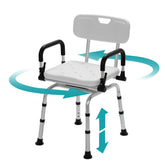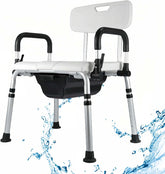10 Bathroom Fall Prevention Tips Every Senior Should Know in 2025
Every 11 minutes, an older adult is treated in an emergency room for a fall-related injury. What's even more alarming? Over 80% of these falls happen in the bathroom – the most dangerous room in any home for seniors. If you're worried about your safety or that of a loved one, you're not alone. The good news is that most bathroom falls are completely preventable with the right knowledge and equipment.

In this comprehensive guide, we'll share 10 proven bathroom fall prevention tips that have helped thousands of seniors maintain their independence while staying safe. From simple DIY solutions to professional-grade safety equipment, these strategies will transform your bathroom into a secure sanctuary.
What you'll discover in this article:
- The most common bathroom fall hazards and how to eliminate them
- Essential safety equipment every senior bathroom needs
- Professional installation tips for maximum effectiveness
- Cost-effective solutions that work for any budget
- Real-world case studies from families who've prevented serious injuries
Why Bathroom Safety Matters More Than Ever
The Shocking Statistics
According to the National Institute on Aging, bathroom falls account for nearly 234,000 emergency room visits annually among adults 65 and older. These aren't just minor slips – they often result in:
- Hip fractures (responsible for 95% of cases)
- Head injuries requiring hospitalization
- Loss of independence and confidence
- Extended recovery periods lasting months
The Hidden Costs of Bathroom Falls
Beyond the immediate medical expenses, bathroom falls create a ripple effect:
- Average medical cost: $35,000 per serious fall
- Lost independence: 40% of seniors who fall never return to independent living
- Family impact: Increased caregiver burden and emotional stress
Understanding Bathroom Fall Risk Factors
Age-Related Changes That Increase Fall Risk
As we age, several physiological changes make bathroom navigation more challenging:
Vision Changes:
- Reduced depth perception
- Difficulty adjusting to lighting changes
- Increased sensitivity to glare
Physical Changes:
- Decreased muscle strength and balance
- Slower reaction times
- Reduced flexibility and range of motion
Medication Effects:
- Dizziness and lightheadedness
- Blood pressure fluctuations
- Drowsiness and confusion
Environmental Hazards in Every Bathroom
Even the most well-maintained bathrooms harbor hidden dangers:
- Wet, slippery surfaces
- Poor lighting conditions
- Inadequate support structures
- Awkward reaching and bending requirements
10 Essential Bathroom Fall Prevention Tips
1. Install Strategic Grab Bars in Key Locations
Why it works: Grab bars provide crucial support during transfers and balance challenges.
Where to install:
- Next to the toilet (both sides if space allows)
- Inside the shower/tub area (vertical and horizontal bars)
- Outside the shower entrance for safe entry and exit
Professional tip: Ensure grab bars are mounted to wall studs and can support at least 300 pounds. I1204's professional-grade grab bars exceed safety standards and come with detailed installation guides.
Cost-effective alternative: Start with one grab bar in the highest-risk area (usually near the toilet) and add more over time.
2. Add Non-Slip Solutions to Every Surface
The science: Even a thin layer of water can reduce surface friction by up to 70%.
Essential non-slip additions:
- Textured bath mats inside the tub/shower
- Absorbent rugs outside the shower area
- Non-slip stickers on smooth surfaces
- Textured strips on shower floors
Maintenance tip: Replace bath mats every 6-12 months as adhesion decreases over time.
3. Optimize Bathroom Lighting for Safety
The goal: Eliminate shadows and ensure even illumination throughout the bathroom.
Lighting improvements:
- Increase wattage to at least 100 watts equivalent
- Add motion-sensor lights for nighttime navigation
- Install under-cabinet lighting to eliminate shadows
- Use daylight bulbs (5000K-6500K) for better visibility
Quick fix: Add battery-operated LED lights in dark corners – no electrical work required.
4. Choose the Right Shower Chair or Bath Seat
When you need one: If standing for extended periods causes fatigue, dizziness, or balance issues.
Key features to look for:
- Adjustable height to match your needs
- Non-slip feet for stability
- Drainage holes to prevent water buildup
- Comfortable seating with back support
I1204 offers a range of shower chairs designed specifically for different mobility levels, from basic shower stools to full-support bath seats with armrests.
5. Install a Raised Toilet Seat for Easier Transfers
The benefit: Reduces the distance needed to sit and stand, decreasing fall risk by up to 35%.
Choosing the right height:
- Standard raise: 2-4 inches for most users
- Higher raise: 5-6 inches for severe mobility limitations
- With armrests: Additional support for transfers
Installation tip: Ensure the raised seat fits securely on your existing toilet without wobbling.
6. Create Clear, Obstacle-Free Pathways
The principle: Remove any item that could cause tripping or block emergency assistance.
Common obstacles to remove:
- Bathroom scales left on the floor
- Towels and clothing
- Small rugs without non-slip backing
- Decorative items at floor level
Organization strategy: Use wall-mounted storage and hooks to keep floors completely clear.
7. Maintain Optimal Water Temperature Control
The danger: Sudden temperature changes can cause dizziness and loss of balance.
Safety measures:
- Set water heater to 120°F (49°C) maximum
- Install anti-scald devices on faucets and showerheads
- Test water temperature before entering shower
- Use thermostatic mixing valves for consistent temperature
8. Keep Essential Items Within Easy Reach
The strategy: Eliminate dangerous reaching, bending, and stretching.
Optimal placement:
- Toiletries at shoulder height or below
- Towels within arm's reach of shower
- Emergency items (phone, medical alert) easily accessible
- Cleaning supplies stored safely away from daily use areas
Storage solutions: Install corner shelves and caddies at appropriate heights.
9. Address Mobility Challenges with Assistive Equipment
For different mobility levels:
Mild mobility issues:
- Walking canes with wrist straps
- Lightweight grab bars
- Basic shower seats
Moderate mobility challenges:
- Four-wheel walkers with seats
- Transfer benches for bathtubs
- Toilet safety frames
Significant mobility limitations:
- Bathroom wheelchairs
- Ceiling-mounted transfer systems
- Walk-in tubs or roll-in showers
I1204 specializes in providing the right assistive equipment for each mobility level, with expert consultation to ensure proper fit and function.
10. Establish a Bathroom Safety Routine
Daily habits that prevent falls:
Morning routine:
- Turn on all lights before entering
- Check for water on floors
- Ensure all equipment is properly positioned
Evening routine:
- Wipe down wet surfaces
- Position night lights
- Lay out needed items for morning
Weekly maintenance:
- Check grab bar tightness
- Clean non-slip surfaces
- Replace worn items
Professional Installation vs. DIY: What You Need to Know
When to Call a Professional
Always hire professionals for:
- Grab bar installation in tile or masonry walls
- Electrical work for lighting improvements
- Plumbing modifications
- Structural modifications
Safe DIY Projects
You can typically handle:
- Adding non-slip mats and stickers
- Installing battery-operated lights
- Organizing and decluttering
- Adding toilet seat risers
Finding Qualified Installers
Look for contractors who:
- Specialize in aging-in-place modifications
- Are licensed and insured
- Provide detailed written estimates
- Offer warranties on their work
Cost-Effective Implementation Strategy
Phase 1: Immediate Safety (Under $100)
- Non-slip mats and stickers
- Improved lighting
- Basic grab bar (one location)
- Toilet seat riser
Phase 2: Enhanced Safety ($100-$500)
- Additional grab bars
- Shower chair or bath seat
- Professional grab bar installation
- Motion-sensor lighting
Phase 3: Comprehensive Safety ($500+)
- Walk-in tub or accessible shower
- Complete lighting overhaul
- Professional bathroom assessment
- Advanced assistive equipment
Real Success Stories: Families Who Prevented Falls
Case Study 1: Margaret's Transformation
The situation: 78-year-old Margaret experienced two minor bathroom slips in one month.
The solution: Her family installed I1204 grab bars, added a shower chair, and improved lighting.
The result: Six months later, Margaret reports feeling confident and secure in her bathroom, with no additional incidents.
Case Study 2: Robert's Independence
The challenge: After a hip replacement, Robert couldn't safely use his bathroom independently.
The intervention: A raised toilet seat, transfer bench, and strategic grab bar placement.
The outcome: Robert regained his independence within three weeks and hasn't required assistance since.
Emergency Preparedness: What If a Fall Occurs?
Immediate Response Plan
If you fall:
- Stay calm and assess for injuries
- Don't attempt to get up immediately
- Call for help using a medical alert device or phone
- Wait for assistance rather than risk further injury
Prevention tools:
- Medical alert systems
- Bathroom phones or intercoms
- Emergency contact lists posted visibly
Maintenance and Long-Term Safety
Monthly Safety Checks
Inspect these items monthly:
- Grab bar tightness and stability
- Non-slip mat adhesion
- Light bulb functionality
- Equipment wear and tear
Annual Professional Assessment
Consider yearly evaluations of:
- Overall bathroom safety
- Equipment effectiveness
- Changing mobility needs
- New safety technologies
Working with Healthcare Providers
Involving Your Medical Team
Discuss bathroom safety with:
- Primary care physicians for overall fall risk assessment
- Physical therapists for mobility and strength recommendations
- Occupational therapists for daily living adaptations
Insurance and Medicare Coverage
Potential coverage includes:
- Durable medical equipment
- Home modification assessments
- Physical therapy evaluations
Documentation tips: Keep receipts and medical recommendations for potential reimbursement.
Conclusion: Your Path to Bathroom Safety
Implementing these 10 bathroom fall prevention tips doesn't have to happen overnight. Start with the most critical safety measures – grab bars and non-slip surfaces – then gradually add additional safety features as your needs and budget allow.
Remember, the best fall prevention strategy is the one you actually implement. Even small changes can make a dramatic difference in your safety and confidence.
Take Action Today
Your next steps:
- Assess your current bathroom using this guide as a checklist
- Prioritize the highest-risk areas for immediate attention
- Contact I1204 for expert guidance on safety equipment selection
- Schedule professional installation for grab bars and major modifications
Expert Support When You Need It
At I1204, we understand that every senior's needs are unique. Our team of mobility specialists can help you create a personalized bathroom safety plan that fits your specific situation and budget. Visit I1204.com to explore our complete range of bathroom safety solutions or contact our experts for a free consultation.
Don't wait for a fall to happen. Take control of your bathroom safety today and enjoy the peace of mind that comes with a secure, accessible bathroom designed for your independence.






